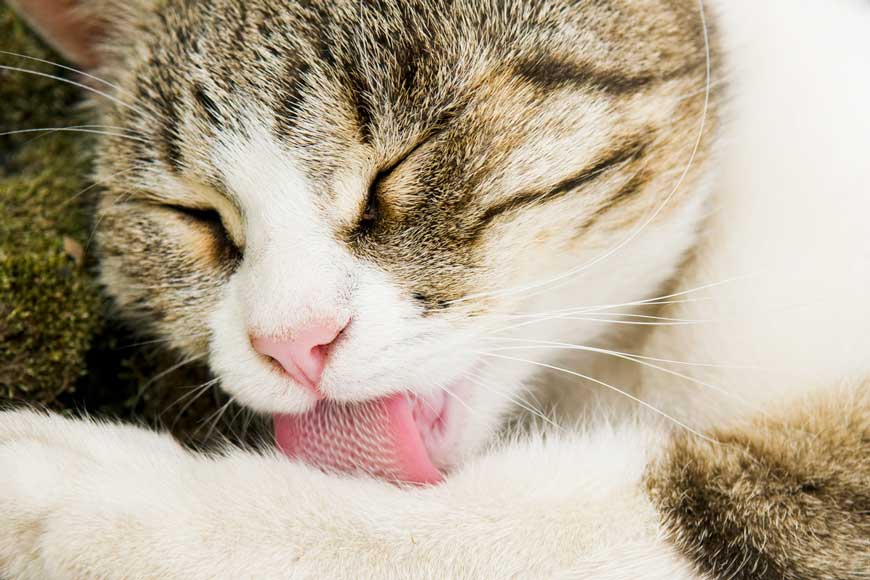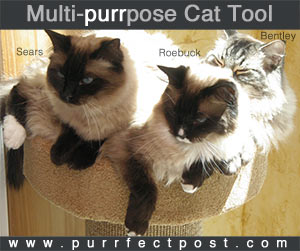Hairballs in Cats

Many people with cats are familiar with the issue of hairballs. The squishy feeling when you accidentally step on one in the middle of the night or the upsetting sounds that your kitty makes as she brings one up are both well-known and dreaded aspects of cat-ownership.
What Are Hairballs?
The scientific name for a hairball is trichobezoar. Tricho means hair and bezoar means an accumulation of indigestible material forming a lump in the digestive tract. Bezoars used to be thought to have magical properties, including the ability to act as antidotes to certain poisons.
What Causes Hairballs in Cats?
Cats are built to swallow and digest fur. Rough barbs on the tongue all point toward the cat's throat, so anything that is caught on them is swallowed. This adaptation evolved to help cats get all of the nutrition they could from their food; even their prey's fur is often consumed after hunting.
Grooming is an important task for a cat as well. It allows them to clean dirt, old hair, and foreign material from themselves and each other. It also presents lots of opportunities for swallowing hair.
The majority of fur that cats ingest passes through the digestive tract and ends up in the feces; it is not a normal part of cat physiology to cough back up undigested pellets, like owls do. However, sometimes the fur builds up to a point that it can't pass out of the stomach into the small intestine. Eventually, depending on the size of the hairball, how rapidly it forms, and how sensitive the stomach is, the hairball comes back up, looking more like a sausage than a ball because of its passage up through the long narrow food pipe, the esophagus.
Sometimes the cat does not bring up the hairball but only some undigested food that isn't able to move past the hair in the stomach. This may occur several times until either the hairball is able to move along or it finally does come up.
Are Hairballs Normal in Cats?
Occasional hairballs in cats can be normal, especially in long-haired cats or those that groom long-haired housemates. However, many veterinarians feel that if the vomiting occurs more than once or twice a month, the excess hairballs may be associated with another internal problem. There are a number of possible underlying causes that may lead to an abnormal amount of hairball vomiting, including:
-
Over-grooming. If more hair is being swallowed than the cat's system can handle because the cat is removing too much fur from her body, excessive hairball vomiting will occur. The causes of over-grooming include those listed below:
- Stress or anxiety in cats can result in abnormal grooming behavior. Stress can be caused by anything from the schedule change of a person in the home to the addition of a new pet or person.
- Allergies can cause a cat to over-groom herself. Many allergies can manifest as skin conditions, including flea, food, and contact allergies.
- Skin parasites such as scabies and fleas can cause a cat to over-groom. Even cats that are not allergic to fleas and don't become pruritic (itchy) from them tend to groom more to remove the parasites when they are infested.
- Other skin diseases such as ringworm and pemphigus may trigger increased grooming and over-ingestion of hair in cats.
- Pain is a cause of increased grooming in cats. The most common sources of pain that cause cats to lick themselves more are urinary tract problems and abdominal pain.
-
Intestinal Insufficiency. If a cat's stomach or intestines aren't functioning properly due to some illness, excessive hairball vomiting can occur even if the cat is not ingesting too much hair. Some common cat conditions that cause intestinal insufficiency include:
- Inflammatory bowel disease is a condition in cats that causes the intestines to be inflamed and not function properly. Common signs are diarrhea, weight loss, and vomiting. Increased incidence of hairballs may be an early indicator of inflammatory bowel disease.
- Gastrointestinal cancer in cats can cause the stomach or intestines to function poorly.
- Food intolerances are a common cause of gastrointestinal disease in cats. When cats are sensitive to an ingredient in their diet, the GI tract can respond by developing inflammation and not working as well. This may manifest as vomiting, diarrhea, decreased appetite, weight loss, and/or increased frequency of hairball vomiting.
Uncommon but Serious Complications of Hairballs in Cats
Occasionally, a hairball can lead to serious health problem. Some examples of that include:
- Intestinal blockage. Rarely, a hairball may cause an intestinal blockage in a cat. This may occur anywhere along the digestive tract and is a serious situation. Signs to watch for include continual vomiting, non-productive retching, refusal to eat, and lethargy. If you have any concerns about this, it is important to contact your veterinarian promptly.
- A hairball may very rarely obstruct the esophagus. The signs of this are similar to those of an intestinal obstruction.
- Hair may be aspirated into the nasopharynx (the upper part of the throat behind the nose). This may cause sneezing, runny nose, coughing, and secondary infection.
Sometimes people mistake coughing for hairball retching. If your cat is making a coughing noise routinely and not bringing up a hairball, undigested food, or food when she does it, see your veterinarian immediately to diagnose the cough.
Treatments for Hairballs in Cats
The treatment for your cat's hairball problem depends on its cause. Your veterinarian may need to run some tests and develop a treatment plan for your cat based on the results.
If your cat simply has occasional hairballs because she is long-haired or loves to groom her housemates and your veterinarian does not believe that there is any underlying GI problem, the following treatments might help:
-
Mineral oil-based products are commonly used in hairball prevention and treatment.
- Do not use plain mineral oil or petroleum jelly: these unflavored, unpalatable products may accidentally be inhaled by your cat because she will fight swallowing them. Inhaled oil will result in pneumonia and sometimes death.
- Plain petroleum jelly is also undesirable as an inexpensive alternative to commercial cat hairball preparations because the oil will bind oil soluble vitamins in the gut, so deficiency of these particular vitamins may result.
- Cod-liver oil is also not recommended because it contains excessive amounts of vitamins A and D.
- Commercial hairball treats and diets add soluble fiber to the digestive tract to help keep food and excess hair moving through.
-
Daily grooming to reduce the amount of loose hair available for your cat to ingest is a cornerstone of treating hairballs. Some great brushes include:
- Feeding smaller meals more often throughout the day may aid your cat's body in emptying her stomach more easily.
Don't assume that all hairball vomiting is normal. Check with your veterinarian to determine whether your cat should have further testing.
You May Also Like These Articles:
Inflammatory Bowel Disease in Cats
Feliway - A Useful Tool to Help Treat Stress in Cats
Pica in Cats: Why Cats Eat Strange Things
Foods Toxic to Cats - Slideshow
Pet Insurance: Peace of Mind for Your Cat\'s Health





